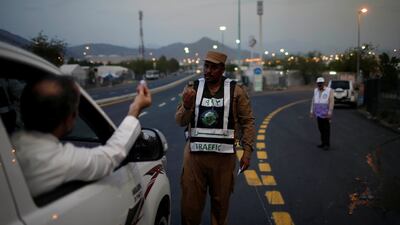Saudi Arabian authorities on Thursday arrested 15 more people after bogus Hajj services were allegedly offered, state news agency (SPA) reported.
The list of services under investigation included transport for pilgrims to the holy sites and accommodation, as well as offering sacrifice on behalf of pilgrims on Eid Al Adha.
It comes after 19 arrests in the kingdom on Tuesday over similar allegations.
Saudi Arabia’s general security said Hajj violators could be fined SR 10,000 ($2,666).
It said pilgrims must obtain a Hajj permit from the official government platforms.
Seven residents of various nationalities were arrested in Makkah over allegedly offering fake services on social media, including helping one perform Hajj on behalf of others who are deceased or unable to do so.
Eight others were arrested in Riyadh over allegedly promoting fake Hajj campaigns and offering transport services, a security official told The National. Seven were from Pakistan. The eighth, an Egyptian, was arrested over allegedly publishing a fake Hajj website.
Earlier this month, police said they had arrested a Yemeni over allegedly forging Hajj 2022 permits.
The General Directorate of Passports (Jawazat) said the penalty for foreign residents violating Hajj services would be deportation from Saudi Arabia with a 10-year ban on returning.
The Ministry of Hajj and Umrah warned pilgrims against using suspicious sites and social media accounts that offer Hajj services.
It said only the ministry's online platforms were authorised to offer and book Hajj campaigns and services during the pilgrimage season.
This year, Hajj will run from July 6 to July 10. Saudi Arabia opened Hajj for more than 1 million pilgrims from abroad this year, unlike the past two years since the Covid-19 pandemic outbreak, when it was restricted to the kingdom's residents only.

